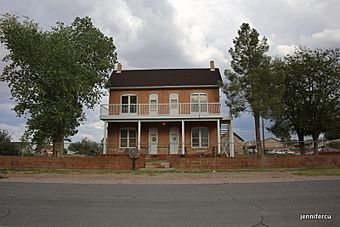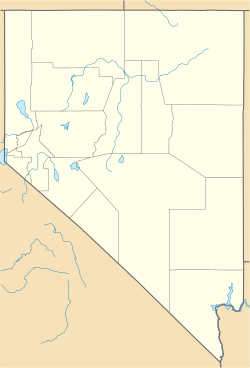Thomas Leavitt House facts for kids
Quick facts for kids |
|
|
Thomas Leavitt House
|
|
 |
|
| Location | 160 S. First West St., Bunkerville, Nevada |
|---|---|
| Built | 1895 |
| Architect | Leavitt, Thomas Dudley |
| Architectural style | Vernacular I-house |
| NRHP reference No. | 91001653 |
| Added to NRHP | November 14, 1991 |
The Thomas Leavitt House is a historic brick house built in the late 1800s. It is located in Bunkerville, Nevada, United States. This special house is listed on the National Register of Historic Places. This means it is recognized as important to the history of the country.
Contents
Who Was Thomas Leavitt?
The Thomas Leavitt House was built by a man named Thomas Dudley Leavitt (1857–1933). He was born in Santa Clara, Utah. In 1877, Thomas Leavitt moved to Bunkerville, Nevada, with 22 other people. They were all members of The Church of Jesus Christ of Latter-day Saints.
How Bunkerville Was Founded
Thomas Leavitt's group wanted to create a special community. They followed ideas from early church leaders like Joseph Smith. Their community was based on working together and sharing property. This was a bit different from the usual system of tithing (giving a portion of income to the church). However, the church leader Brigham Young allowed them to build their settlement. This community was part of a larger idea called the United Order.
The Design of the Thomas Leavitt House
Thomas Leavitt built this two-story brick home in Bunkerville. It was designed in a style called "Vernacular I-house." This type of house was common for settlers moving from Salt Lake into areas like Idaho and Nevada.
Unique Features of the House
The house is T-shaped, two stories tall, and one room deep. It has chimneys at each end. A unique feature of the house is its many exterior doors. This design allowed people to move around easily inside. The house did not have hallways. Large wooden porches surrounded the outside of the home.
Life at the Leavitt House
Thomas Leavitt was a successful farmer. He grew grain, raised cattle, and sold molasses. He became very prosperous. Over time, Thomas Leavitt had a large family. He eventually built another house right next door for part of his family.
The House Today
Today, the original brick house is still standing. It is listed on the National Register of Historic Places. The house sits on a large piece of land with a picket fence around it. You can also see honey locust trees, chicken coops, and the house's original stone granary (a building for storing grain) out back. The house still shows what life was like in the early settlement.
Thomas Dudley Leavitt Park
There is also a park in Bunkerville named after this important pioneer. It is called Thomas Dudley Leavitt Park.



